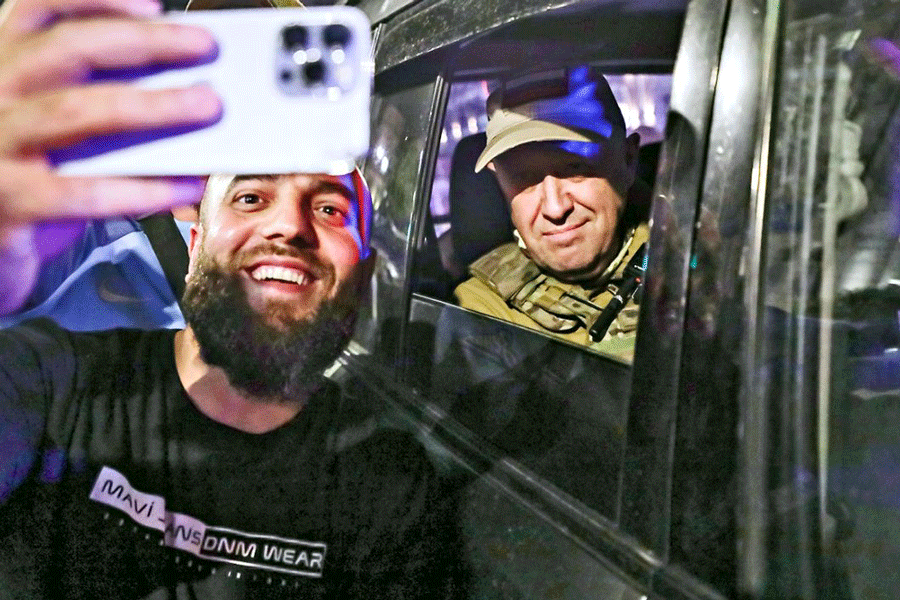Over the course of a month I spent in the Russian capital, the red-and-black billboards of Yevgeny V. Prigozhin’s Wagner paramilitary group multiplied. “Join the team of victors!” they said, beneath an image of menacing mercenaries in balaclavas and masks, only their eyes visible.
A possible implication was that the Russian forces on the other mushrooming Moscow billboards — regular soldiers recruited by the ministry of defence pictured above slogans like “Real Work!” or “Be a hero!” — were the losers of President Vladimir V. Putin’s reckless gamble in Ukraine.
As heedless Muscovites headed for their offices and gyms, their Italian or Japanese restaurants, their bars and nightclubs, this military recruitment drive on two fronts offered the sole image in the capital of the Russian scramble to contain the fallout, and hide the full impact, of the invasion that began 16 months ago. Easier to order a latte than dwell on lost lives in Mariupol.
Now, with his blunt depiction of that invasion as a “racket” that “wasn’t needed to demilitarise or denazify Ukraine”, and his apparently short-lived armed uprising, Prigozhin has played on one of Putin’s worst fears: division and rebellion, with tanks on the streets, as in the mayhem of the 1990s from which Putin, a former KGB officer, abruptly emerged as the inscrutable President and Mr Stability.
Since then, over 23 years, Putin has steadily consolidated his power, using his wars that began in Chechnya to cement nationalist sentiment, terrorising the Opposition to the point that dissent has become a crime, and shaping a wildly unequal economy around a coterie of handpicked oligarchs. He has reverted Russia to type as an autocratic police state under an all-powerful latter-day czar after its brief but heady post-communist flirtation with a freer society.
“The system Putin built is very stable,” a western ambassador in Moscow told me this month.
“But if I woke up one morning and saw tanks on the street, I would not be totally astonished.”
This surprising disclosure, uttered under customary diplomatic anonymity, is indicative of the close-knit secrecy of Putin’s inner circle.
In muttered expressions across the country of bewilderment and anger, and not least in Prigozhin’s foul-mouthed diatribes against what he sees as the craven incompetence and half-measures of Russia’s generals, lay the seeds of those tanks in the ambassador’s prescient imaginings.
The question, for many months now, has been how Prigozhin, a former convict who started in hot dogs in St. Petersburg and went on to provide catering for the Kremlin, has survived.
If the family of a Russian child drawing a picture of a Ukrainian flag risks prison in Putin’s Russia, how could this loudmouth in battle fatigues get away with suggesting that Sergei K. Shoigu, the defence minister, has enabled genocide, among a torrent of other accusations and insults?
I heard many answers across Russia. But perhaps the most fundamental lay in the recently dug grave of Boris Batsev, aged 42, a railroad worker who was killed six months ago near Bakhmut in eastern Ukraine, leaving a wife and two children.
Brightly coloured plastic roses and carnations were piled high around his gravestone, beneath the red-and-gold Wagner flag, in Siberia, near the town of Talofka, thousands of miles from the Ukrainian front.
“Blood, honour, motherland, bravery,” a Wagner inscription said. A mild breeze blew across the Troetskoe cemetery as agents of the Federal Security Service, or FSB, looked on from a vehicle that had abruptly appeared nearby.
With Russian forces often bereft of essential equipment and sometimes operating as a human wave, Putin has needed flesh for the meat grinder. Prigozhin, recruiting in Russian prisons with offers of amnesty and big payouts, could provide that, from as far away as Siberia. He has been too effective and useful to toss aside.
The use of Prigozhin, others suggested, was the apotheosis of Putin’s modus operandi of dividing his subordinates, shifting influence in recent years from Sergey V. Lavrov, the foreign minister, to Shoigu as the militarisation of Russian society proceeded, only to undermine the defence minister through Prigozhin.
Prigozhin has been useful in other ways for Putin. Through Wagner, he has helped project a ruthless and lawless form of Russian power across several African countries, including Mali and the Central African Republic. He was also a way, in the midst of an utterly misjudged war, for the Russian leader to play the moderate, to suggest that if it was not for him, things could be even worse and become as unstable as Prigozhin’s temper.
Finally, Prigozhin became an increasingly popular mouthpiece for the widespread resentment of moneyed Russian elites, oblivious to the cost and suffering of the war in Ukraine. This was cathartic, given accumulated Russian frustrations, and perhaps useful to Putin in that sense.
But the paramilitary leader also developed, through adept use of social media and compelling rhetoric over the past nine months, into a true national figure, with a notoriety that has made him the object of much debate and speculation about a possible political future.
Putin has now awakened to this danger, even as Prigozhin may have overplayed his hand.
The Russian President has spoken of an “armed rebellion”, and a former commander of Russian troops in Ukraine has spoken of a “military coup”, but Prigozhin’s description of his actions as a “march for justice” will have resonated with some, perhaps many, Russians.
These sentiments will not disappear overnight, even if, according to Dmitri S. Peskov, the Kremlin spokesman, Prigozhin has now ceased moving military convoys towards Moscow and agreed to go to Belarus in exchange for charges being dropped again him and his fighters.
It had been a long time since Putin blinked in this way.
New York Times News Service









